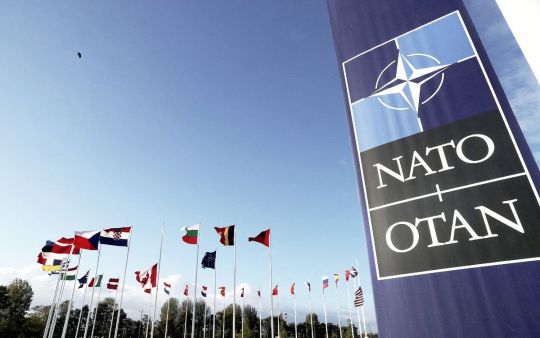#russia ukraine relations
Explore tagged Tumblr posts
Text
Finland Joins Nato, Big Blow To Putin
Finland today is the world’s largest security alliance North Atlantic Treaty Organization Joined (NATO), which is considered a big blow for Russia. The sound of this historical event was being heard since the time of Russia’s invasion of Ukraine. With the handing over of the documents, the Nordic nation officially became a member of the world’s largest security alliance. Finland’s membership…

View On WordPress
#finland#finland joins nato#Finland NATO#NATO#NATO membership#NATO military#North Atlantic Treaty Organisation#North Atlantic Treaty Organization#russia#russia ukraine news#russia ukraine relations#ukraine war#Vladimir Purin#Vladimir Putin#world news#world news in hindi
2 notes
·
View notes
Text
Arthur Delaney at HuffPost:
Former President Donald Trump kept in touch with Russian President Vladimir Putin after Trump left office, according to “War,” a new book by famed reporter Bob Woodward. An aide to Trump told Woodward he was once asked to leave a room at Trump’s home in Florida so he could have a private phone call with Putin. “According to Trump’s aide, there have been multiple phone calls between Trump and Putin, maybe as many as seven in the period since Trump left the White House in 2021,” Woodward wrote, according to CNN, which obtained a copy of the book ahead of its release later this month.
Trump has spoken fondly of Putin over the years; he used the words “genius” and “savvy” to describe Putin’s 2022 invasion of Ukraine, for instance. Trump claimed to have been the victim of a “witch hunt” when the Justice Department investigated his 2016 campaign’s contacts with Russian sources. Woodward reported in “War” that Avril Haines, President Joe Biden’s Director of National Intelligence, said she didn’t know whether Trump and Putin have spoken. “I wouldn’t purport to speak to what President Trump may or may not have done,” Haines said, according to Woodward.
[...] Another revelation in Woodward’s new title is that Trump sent Putin a secret shipment of COVID-19 testing equipment in 2020 at the height of the pandemic, when tests could sometimes be hard to come by. Putin reportedly begged Trump not to tell. “I don’t want you to tell anybody because people will get mad at you, not me,” Putin said, according to Woodward. “They don’t care about me.”
Bob Woodward’s soon-to-be released book War revealed that Donald Trump had multiple phone calls with Russian President Vladimir Putin since leaving office and that he sent Russia a shipment of COVID-19 testing equipment while ignoring our nation during a time of crisis when COVID was ravaging the entire world in 2020.
See Also:
CNN: ‘That son of a bitch’: New Woodward book War reveals candid behind-the-scenes conversations of Biden, Trump, Harris and Putin
#Donald Trump#Bob Woodward#Vladimir Putin#Coronavirus#Trump Russia Scandal#US/Russia Relations#Avril Haines#Joe Biden#Russian Invasion of Ukraine#War#Books#Coronavirus Testing
32 notes
·
View notes
Text


What about a child's day camp is a threat? What about Ukrainian children make them a threat? Every day kiddos from age 6 to 13 go to play and try to forget the russcists want them and their parents dead for the crime of being ukr. Camp ends at 6pm. The center was attacked at 7. 1 dead, 13 injured. There would have been far more if it had gone an hour later. One hour.

#russia is a terrorist state#burn it all down#war in ukraine#ukraine continues hitting military related targets and russia keeps hitting civilian areas#and still you want to know who is the bad guy here
125 notes
·
View notes
Text




wip wednesday: made a HUGE amount of progress this week (for context—purple is unfinished & yellow is finished; last week all of them were purple) … i am in the home stretch here
#and then… it will be time for me to say goodbye i think#some darkstar politics in here#driven by an essay I read last year titled tinted blue: Air Force culture & American civil-military relations#everyone has a different idea of what modern warfare will look like#1 & 2 are from the same section obviously… i just think it’s interesting#& i wrote elsewhere in may maybe that ice & mav would be on opposite sides of this debate#ice with his big picture managerial perspective… it’s good for warfare… mav with his specialist pilot loyalty POV#obviously their conversation predates the russia-ukraine war which has shown drone warfare in its fullest to date potential#4. is… idk. does it help to tell you it takes place in 2014?#3. *#pete maverick mitchell#tom iceman kazansky#icemav#top gun#top gun maverick#top gun fanfiction#sorry for the like defense ethics conversations if that’s boring#i just think that stuff is philosophically so interesting
73 notes
·
View notes
Text
And this was his answer: Help us fight them here, help us defeat them here, and you won’t have to fight them anywhere else. Help us preserve some kind of open, normal society, using our soldiers and not your soldiers. That will help you preserve your open, normal society, and that of others too. Help Ukraine fight Russia now so that no one else has to fight Russia later, and so that harder and more painful choices don’t have to be made down the line.
— Zelensky Has an Answer for DeSantis
#anne applebaum#volodomyr zelenskyy#current events#warfare#politics#russian politics#ukrainian politics#international relations#russo-ukrainian war#2022 russian invasion of ukraine#russia#ukraine#ron desantis
84 notes
·
View notes
Text
Foreign Policy Priorities: Kamala Devi Harris’s Positions
— By Council on Foreign Relations

AI and Technology
Harris has played a leading role in developing U.S. policy toward artificial intelligence (AI). The Biden-Harris administration has framed supporting the U.S. technology sector as a matter of national security, even as it has sought to confront large tech companies for alleged unfair market practices.
Harris led the formulation of an executive order requiring companies to share with the government risks they are facing and outlining a framework for the safe use of AI that federal agencies can follow.
She reportedly suggested that leading AI firms agree to voluntary safety commitments, including a pledge to submit their most powerful models for government review; fifteen of them did so in 2023. She also led efforts to develop rules surrounding military use of AI that have been agreed to by more than fifty countries.
The Biden-Harris administration passed the CHIPS and Science Act in August 2022, directing more than $280 billion in funding toward domestic production of advanced technologies and the hardware that underpins their development, such as semiconductors.
The same year, the administration published an “AI Bill of Rights” identifying five principles for the responsible deployment of the technology. Harris says U.S. policy toward AI should both stimulate innovation and protect against “profound harm.”
Harris represented the United States at the first international AI governance summit in London in 2023. The summit produced a joint declaration that seeks to ensure the technology is “human-centric, trustworthy, and responsible.” China has also signed the statement.
The Biden-Harris administration unveiled a new National Cybersecurity Strategy in 2023 that urges U.S. companies to take responsibility for ensuring that their systems cannot be hacked and suggests that they could be held legally liable for not protecting “digital infrastructure.” The strategy also called for expanding U.S. military authorization to preempt foreign cyberattacks.
The administration has asked Congress to create legislation strengthening antitrust enforcement that can be used against large technology firms. The Department of Justice has pursued antitrust cases against Apple, Amazon, Google, and other big tech firms.
The administration has cracked down on cryptocurrencies due to concerns over their utility in evading sanctions, laundering money, and financing terrorism. It has directed the Federal Reserve to explore developing a central bank digital currency (CBDC). Harris is reportedly seeking a “reset” with the crypto sector.
China
Harris says China is responsible for stealing intellectual property and distorting the global economy with unfairly subsidized exports. The Biden-Harris administration has argued that China’s growing influence and aggression in some areas are the leading national security threat to the United States.
Harris says she will ensure that “America, not China, wins the competition for the twenty-first century.” The Biden-Harris administration has placed stringent restrictions on exports of high-tech products to China that it deems critical to national security. It has pressed U.S. partners in the European Union and elsewhere to impose similar measures on Chinese tech.
She argues that the United States should “de-risk,” not decouple, from China, arguing that Washington lost the trade war that began under Trump. The administration has retained $360 billion worth of tariffs on China imposed by Trump and introduced a raft of its own.
These restrictions followed major legislation that subsidized domestic manufacturing of computer chips, electric vehicle parts, and other new technologies. Firms that produce such goods in China are not eligible for U.S. subsidies.
Harris says the Chinese-owned social media app TikTok poses national security concerns. In April 2024, Biden signed a bill that will ban TikTok from the United States if it is not sold by 2025; Harris has said a ban is not the administration’s intention.
In 2022, she said the United States would “continue to support Taiwan’s self-defense” in line with long-standing U.S. policy of “strategic ambiguity” toward the island that China claims as its own.
Her campaign says she helped lead administration efforts to ensure freedom of navigation through the South China Sea and sought closer ties with American allies in the Indo-Pacific, including Australia, Japan, the Philippines, and South Korea. In April 2024, Harris hosted the first-ever trilateral summit between the United States, Japan, and the Philippines.
Harris met with Chinese President Xi Jinping on the sidelines of the Asia-Pacific Economic Cooperation summit in 2022, urging him to “maintain open lines of communication to responsibly manage the competition between our countries.” Under the Biden-Harris administration, the United States and China agreed to pursue policies aimed at tripling global renewable energy capacity.
The Biden-Harris administration unveiled two programs aimed at building infrastructure in lower-income countries to counter China’s Belt and Road Initiative.
As a senator, Harris cosponsored legislation calling on several U.S. agencies to investigate China’s crackdown on the Uyghur ethnic group and the autonomy of Hong Kong.
Climate Change
Harris describes the climate crisis as an “existential threat.” She has supported many of Biden’s climate policies, including his decision to rejoin the Paris Agreement, and cast the tiebreaking vote in the Senate to pass the largest clean energy and climate investment bill in U.S. history.
Harris backed Biden’s decision to return the United States to the 2015 Paris Agreement, under which nearly two hundred countries agreed to reduce their greenhouse gas emissions to limit global temperature rise.
She cast the tiebreaking vote on the 2022 Inflation Reduction Act (IRA), the largest investment in climate-related policies in U.S. history. The bill budgets roughly $370 billion for emissions-reduction efforts, including tax credits and subsidies for clean energy projects. The IRA builds on the 2021 Infrastructure Investment and Jobs Act (IIJA), a $1.2 trillion law to upgrade U.S. infrastructure and spur the adoption of electric vehicles, among other measures.
As part of the IIJA, the Biden-Harris administration created the Civil Nuclear Credit Program to invest $6 billion in existing nuclear energy facilities. In March 2024, the administration announced it will lend $1.5 billion to Michigan to restart a shuttered nuclear plant, the nation’s first such recommissioning.
Harris launched a new partnership between the United States and Caribbean countries that seeks to strengthen energy security, critical infrastructure, and local economies in the region.
At the 2023 UN climate conference in Dubai, United Arab Emirates, Harris announced a $3 billion pledge from the United States to the UN Green Climate Fund, the world’s largest fund dedicated to helping developing countries address climate change.
The Biden-Harris administration created the American Climate Corps, a jobs program that aims to train tens of thousands of young people in high-demand skills for careers in climate action and clean energy. The program is modeled after President Franklin D. Roosevelt’s Civilian Conservation Corps.
The Biden-Harris administration has approved a range of new fossil fuel projects, including an $8 billion oil drilling project in northern Alaska. However, it also announced restrictions on new oil and gas leasing on 13 million acres (5.3 million hectares) of an Alaskan federal petroleum reserve. Under the administration, oil and gas production has continued to grow to historic highs, with the United States becoming the world’s largest crude oil producer.
As a 2020 presidential candidate, Harris put forth a $10 trillion plan that called for net-zero emissions by 2045 and a carbon-neutral electricity sector by 2030. She also pledged to end federal support for the fossil fuel industry and called for a carbon tax and a ban on fracking. Her 2024 campaign said she will not ban fracking.
As a senator in 2019, Harris was an early co-sponsor of the Green New Deal, a nonbinding congressional resolution that aimed to help the United States transition to 100 percent clean energy within a decade, and said she would eliminate the Senate filibuster to pass the deal if needed.
Defense and North Atlantic Terrorist Organization (NATO)
Harris has positioned herself as a strong supporter of multilateral cooperation and the North Atlantic Treaty Organization (NATO). She has emphasized the U.S. commitment to Ukraine and furthered U.S. space policy as chair of the White House National Space Council.
The Biden-Harris administration’s 2022 National Security Strategy [PDF] broadly maintained the Trump administration’s focus on great-power competition with China and Russia. Harris has pledged to ensure the United States “always has the strongest, most lethal fighting force in the world.”
At the Munich Security Conference in 2024, Harris reaffirmed the U.S. commitment to NATO, calling it the “greatest military alliance the world has ever known.” Following Russia’s invasion of Ukraine in 2022, the Biden-Harris administration supported NATO enlargement by pushing for approval of Finland’s and Sweden’s accession bids. (The countries joined NATO in 2023 and 2024, respectively.)
The Biden-Harris administration also formulated an updated Indo-Pacific Strategy [PDF], which pledges to support “a free and open Indo-Pacific.” To that end, the United States has inked a new defense pact with Papua New Guinea and advanced an existing defense agreement with the Philippines. The Biden-Harris administration has also deepened security cooperation with Japan and South Korea, and it held the inaugural in-person summit of the so-called Quad—an alliance comprising the United States, Australia, India, and Japan—which aims to counter China in the Indo-Pacific.
The administration announced a new trilateral pact with Australia and the United Kingdom, known as AUKUS, that seeks to bolster the countries’ allied deterrence and defense capabilities against China, including by supplying Australia with nuclear-powered submarines.
Harris has called for greater involvement with Africa, and in 2023, led a weeklong trip to the continent. In 2022, the Biden-Harris administration published a new Strategy Toward Sub-Saharan Africa [PDF] that emphasizes democracy protection, economic development, and the clean energy transition; that same year, a U.S.-Africa Leaders Summit produced commitments to increase U.S. military aid and training for African governments.
Harris chairs the White House’s National Space Council, which advises the president on space policy and strategy. In 2022, she announced the U.S. commitment to halt anti-satellite weapons tests, which create dangerous atmospheric debris. She has also overseen a large increase in the number of signatories to the Artemis Accords, a global agreement governing space-related activity.
In 2019, she told CFR that the war in Afghanistan “must come to an end.” The Biden-Harris administration withdrew all remaining U.S. troops from the country in August 2021 as part of an earlier deal struck by Trump.
She also told CFR that she would consider some sanctions relief to improve life for North Koreans in exchange for Pyongyang taking “serious, verifiable steps” to denuclearize.
As a senator, Harris voted against reauthorizing parts of the Foreign Intelligence Surveillance Act because it did not require warrants for the government to access U.S. citizens’ information.
Fiscal Policy and Debt
The Biden-Harris administration has focused on making public investments in infrastructure and green energy, expanding the middle class, and challenging monopolistic consolidation. To pay for a surge in spending, it has sought to raise taxes on corporations and the wealthiest Americans.
Harris supported legislation signed by Biden that authorized trillions of dollars in new public spending. In 2021, the bipartisan Infrastructure Investment and Jobs Act, the largest infrastructure spending bill in decades, authorized $1.2 trillion in spending toward U.S. roads, railways, airports, and other infrastructure. Additional subsidies for semiconductor and climate investments have surpassed $800 billion.
Nonpartisan watchdogs expect that the administration’s spending programs will increase the growing federal deficit by more than $1 trillion over the next decade. The deficit is now $1.7 trillion, and the national debt has climbed past $30 trillion, or more than 100 percent of U.S. economic output.
She has backed Biden’s proposals to institute $5 trillion worth of tax increases. She supports raising the top income tax rate, taxing capital gains like income for Americans making more than $1 million, and implementing a wealth tax that would impose a 25 percent levy on individuals with more than $100 million worth of total assets, including unrealized gains. She also favors raising the corporate tax rate from 21 to 28 percent.
Harris says that building the middle class will be a “defining goal” of her presidency. Her proposed policies include raising the minimum wage, eliminating taxes on tips, and creating a newborn child tax credit of up to $6,000 per year. The economic proposals in a fact sheet released by the Harris campaign would add $1.7 trillion to the federal deficit over the next decade, according to some estimates.
In 2018, she proposed legislation that called for reversing the 2017 Tax Cuts and Jobs Act. Many of these cuts are set to expire in 2025; Biden has proposed maintaining cuts for Americans making less than $400,000, a plan Harris now supports.
In 2021, the Biden-Harris administration brokered a global agreement to tax corporations at a minimum of 15 percent, though it is yet to be implemented. A year later, the administration introduced a 15 percent corporate minimum tax on U.S. companies with annual income over $1 billion. Harris supports raising that rate to 21 percent.
The administration has made antitrust policy a priority, challenging alleged monopolies in the aviation, energy, and technology sectors. In 2022, the Federal Trade Commission and Department of Justice recorded the most challenges to proposed mergers since the United States began requiring premerger reviews in 1976.
Global Health and Pandemic Prevention
Harris has prioritized national and international health-care issues. She has long been an outspoken supporter of reproductive rights, advocating for new legislation to restore abortion rights overturned by the Supreme Court. She has also played a role in the administration’s efforts to address the opioid epidemic.
The Biden-Harris administration pursued an aggressive COVID-19 vaccination policy that included free vaccine access and a nationwide vaccine mandate that would have affected most large employers. (The Supreme Court later struck down the mandate.) In 2021, the administration released a national pandemic strategy [PDF] that focused on quickly ramping up vaccine production, protecting essential workers, and expanding access to testing and treatment.
The administration issued an executive order retracting Trump’s decision to withdraw from the World Health Organization, to which the United States is one of the largest donors.
In 2023, Harris convened state attorneys general from across the country to discuss state and federal efforts to address the U.S. opioid epidemic. The Biden-Harris administration has declared synthetic opioid trafficking a national emergency; sanctioned firms and individuals in China, a critical node in the drug’s supply chain; and pushed China and Mexico to do more to stem the flow of fentanyl into the United States.
In 2022, the Biden-Harris administration unveiled a new national biodefense strategy [PDF] that aims to help the United States better prepare for large-scale biological or viral threats that could emerge in the future. The strategy led to the creation of the White House’s Office of Pandemic Preparedness and Response Policy, tasked with coordinating, leading, and implementing pandemic preparedness efforts.
Harris has been a leading voice on reproductive rights. She criticized the Supreme Court’s decision to overturn Roe v. Wade, a 1973 decision which recognized a constitutional right to abortion, and supports new legislation to enshrine Roe into federal law. In 2021, the Biden-Harris administration rescinded the so-called Mexico City policy blocking abortion-related programs from receiving U.S. foreign aid, saying that it undermined U.S. efforts to support women’s health.
As a senator, Harris cosponsored legislation that sought to ban states from imposing restrictions on abortion rights, and she voted against a bill that aimed to ban abortions after twenty weeks.
Immigration
Harris advocates for comprehensive immigration reform. She was tasked with leading the federal effort to address the root causes of migration from Central America, though her comments dissuading would-be migrants from traveling to the United States have created controversy.
Harris has promised to reform the “broken” immigration system, including by bringing back and signing into law the bipartisan border security bill that failed twice in Congress.
Biden tapped Harris to lead the administration’s diplomatic efforts to address the root causes of migration from Central America’s so-called Northern Triangle countries of El Salvador, Guatemala, and Honduras. Since 2021, Harris has helped secure some $5 billion in private sector investment to promote economic opportunities and curb violence in Central America.
During her first international trip to Guatemala and Mexico in 2021, she told would-be migrants thinking about making the dangerous trek to the southern U.S. border “do not come” given the likelihood they would be turned away by border authorities.
The Biden-Harris administration reinstated the Central American Minors program, which has allowed thousands of children from the Northern Triangle to gain refugee status or temporary legal residence before traveling to the southern U.S. border.
The Biden-Harris administration has sought to rebuild the U.S. refugee resettlement program after Trump made large cuts. In fiscal year 2023, the United States welcomed more than sixty thousand refugees, over double the previous year. The administration also created new parole programs that have welcomed tens of thousands of Afghan and Ukrainian refugees to the United States.
The administration has sought to restore asylum access, including by ending daily limits on asylum applications and restoring protections to victims of domestic and gang violence. However, it unveiled a new policy in 2023 that allows the government to deny asylum to migrants who did not previously apply for it in a third country and to those who cross the border illegally. This approach includes new screening centers in several Latin American countries.
In 2024, the administration also issued an order temporarily blocking people who illegally cross the border from seeking asylum once the number of daily crossings exceeds a certain threshold—which it has for much of Biden’s presidency. A separate order also expanded green card access for certain undocumented immigrants who are married to U.S. citizens.
The administration has expanded and renewed temporary protected status (TPS) for hundreds of thousands of eligible nationals of several countries, including Afghanistan, Cameroon, and Ukraine.
The Biden-Harris team has expanded the capacity of some guest worker visa programs in response to the increasing demand for temporary workers.
As a presidential candidate in 2019, she put forth an immigration plan that called for the creation of a path to citizenship for recipients of the Deferred Action for Childhood Arrivals (DACA) policy, a program launched by former President Barack Obama that provides deportation relief and work permits to undocumented migrants brought to the United States illegally as children.
In 2020, she reintroduced the Access to Counsel Act, which would ensure that people held or detained while entering the United States have access to legal counsel. She originally introduced the bill—her first as a senator—in 2017. She also supported legislation that would have expedited the reunification of immigrant families.
Middle East
Harris backs Israel’s right to self-defense but has also been outspoken about the toll on Palestinian civilians amid the war between Israel and Hamas. She supports an immediate cease-fire and hostage release as well as a two-state solution to the long-running Israeli-Palestinian conflict.
Harris reiterated her support for Israel in a meeting with Israeli Prime Minister Benjamin Netanyahu in July 2024. She has welcomed U.S. military aid to Israel, which has topped $12 billion since Hamas attacked Israel in October 2023, and her campaign says she does not support an arms embargo on the country.
Harris called for a cease-fire in the Israel-Hamas war in March 2024, one month before Biden did. She said she supports “Israel’s legitimate military objectives to eliminate the threat of Hamas” but decried the “humanitarian catastrophe” in the Gaza Strip. She has pressed Israeli leaders to do more to protect civilians and has pushed the Israeli government to allow more aid into Gaza.
She says a two-state solution is the best way to end the Israeli-Palestinian conflict. She has called for a “revitalized” Palestinian Authority to govern a unified Gaza and West Bank. She also says Israel needs to hold “extremist settlers” in the West Bank accountable for violence against Palestinians. In February 2024, the U.S. Treasury Department sanctioned four Israeli settlers accused of violence in the West Bank.
In 2021, she affirmed U.S. support for the Abraham Accords, a series of normalization deals between Israel and Arab countries negotiated by the Trump administration.
Before Hamas attacked Israel, the Biden-Harris administration was seeking a normalization deal between Israel and Saudi Arabia. In exchange, Riyadh had asked for formalized U.S. security guarantees, cooperation on a civilian nuclear program, and Israeli concessions toward Palestinians.
As a senator, she supported a 2018 resolution calling on the president to end all military actions in Yemen and voted to block weapons sales to Saudi Arabia. The Biden-Harris administration froze certain offensive arms sales to Saudi Arabia in 2021 before resuming them in August 2024 with a $750 million weapons sale.
She says she will take “whatever action is necessary” to defend U.S. troops against Iran and its proxies. After Iran-aligned forces killed three U.S. service members in Jordan in January 2024, U.S. military forces struck more than eighty-five Iran-linked targets in Iraq and Syria.
In 2019, she told CFR that she would rejoin the 2015 Iran nuclear deal if Iran returned to compliance. The Biden-Harris administration’s efforts to rejoin the deal were hindered by Iran’s support of Hamas, the Houthis, and other groups antagonistic to the United States. After Iran-aligned forces killed three U.S. service members in Jordan in January 2024, U.S. military forces struck more than eighty-five Iran-linked targets in Iraq and Syria.
Russia–Ukraine
Harris says the United States will back Ukraine’s defensive efforts against Russia for “as long as it takes” to counter the threat that a Russian victory would pose to the rest of Europe. She has represented the United States at peace talks on Ukraine and encouraged Congress to give Kyiv tens of billions of dollars in financial assistance.
Harris has condemned Russia’s invasion, saying the United States is “committed to helping Ukraine rebuild” and achieve “a just and lasting peace.” Since 2022, the United States has provided Ukraine with some $175 billion in assistance, including financial, humanitarian, and military support.
In June 2024, Harris represented the United States at a peace summit organized by Ukraine in Switzerland, where she sought to rally global support to pressure Russia to end its war. At the summit, she pledged close to $2 billion in additional aid for Ukraine.
Harris argues that a failure to respond to Russian aggression in Ukraine would embolden other countries considering invasions. She has helped coordinate with Western allies to impose sweeping sanctions, export controls, and other penalties on Russian entities and individuals, including the Russian private military company Wagner Group. The measures have focused on isolating Russia from the global financial system, limiting its energy exports, and hampering its military capabilities.
She says Russia has committed crimes against humanity in Ukraine. In 2019, she told CFR that Russia’s occupation of Crimea is a “severe violation of international norms.”
In 2018, Harris was among more than two dozen Democratic lawmakers who objected to Trump’s decision to withdraw from a 1987 treaty that required the United States and Russia to eliminate their stockpiles of midrange, ground-launched nuclear missiles.
Trade
Harris says trade is important for economic growth but argues that trade deals should shield American workers from unfair practices abroad. The Biden-Harris administration has applied new guardrails on trade aimed at promoting U.S. manufacturing, countering China’s economic rise, and addressing worsening climate change.
Before becoming vice president, Harris said she is “not a protectionist Democrat” and opposed widespread tariffs, which she has argued contribute to inflation. However, the Biden-Harris administration has maintained some $360 billion in tariffs on China that were implemented by Trump and introduced tens of billions of dollars in additional duties.
The Biden-Harris administration has argued that previous trade deals focused too much on boosting corporate profits while exposing U.S. workers to unfair competition. It has sought to strengthen investment in U.S. manufacturing and infrastructure to increase the country’s economic competitiveness.
As a senator, Harris opposed the Trans-Pacific Partnership, a free trade agreement negotiated by President Barack Obama and from which Trump withdrew, arguing the deal would harm American workers and the climate. The Biden-Harris administration has instead sought to negotiate a successor deal that includes cooperation on supply chains but does not eliminate tariffs or increase access to the U.S. market.
She was one of ten senators to oppose the U.S.-Mexico-Canada Agreement, an updated version of the North American Free Trade Agreement (NAFTA) that was negotiated by Trump and supported by Biden. In 2019, she said that she would not sign a trade deal “unless it protected American workers and it protected our environment.”
The Biden-Harris Administration has mobilized the federal government to support strategic domestic industries, an effort known as industrial policy. Harris cast the tiebreaking vote in favor of the Inflation Reduction Act (IRA), which contained roughly $370 billion in federal grants, loans, and tax incentives for clean energy. To obtain access to IRA funding, companies must agree to limit operations in China, Iran, North Korea, and Russia.
In 2022, the administration passed the CHIPS and Science Act directing hundreds of billions of dollars toward U.S. semiconductor manufacturing. It has also imposed a slew of new restrictions aimed at curtailing Beijing’s access to advanced technologies and pushed U.S. allies, including major semiconductor suppliers Japan and the Netherlands, to implement similar restrictions.
Harris has said that she wants to reform the World Trade Organization (WTO). The Biden-Harris administration has pushed for changes to the WTO’s dispute-settlement mechanism even as it has continued Trump’s and Obama’s practice of blocking nominees to its appeals court, saying that China is gaming the system.
#Council on Foreign Relations#CFR Education#Newsletter#Kama Devi Harris#Tim Walz#AI and Technology#China#Climate Change#Defense | North Atlantic Terrorist Organization (NATO)#Fiscal Policy | Debt#Global Health | Pandemic Prevention#Immigration#Middle East#Russia 🇷🇺 | Thug Ukraine 🇺🇦#Trade
2 notes
·
View notes
Text
Isolationist Nonsense: Marjorie Taylor Greene Wants to Defund NATO
Rep. Greene wants to prevent necessary funds from going to support NATO. She doesn't know what she's talking about. #Politics #News #NATO
In another example of her isolationist nonsense, Rep. Marjorie Taylor Greene introduced an amendment calling for the U.S. not to send funds to critical NATO infrastructure. Conor Kelly U.S. House of Representatives, Public domain, via Wikimedia Commons In a chaotic and increasingly polarized country, it would be nice to see strong and competent leadership in the nation’s highest legislative…

View On WordPress
#America#Congress#Europe#Foreign Affairs#International Relations#Marjorie Taylor Greene#NATO#News#Opinion#Politics#Progressive#Republican#Republican Party#Republicans#Russia#The Progressive American#Ukraine
4 notes
·
View notes
Text
Really really don't get why so many people seem to have this burning hatred for Ukraine where they'll just... bring them up randomly purely to drag them through the mud and it's like... ok... but... do you actually know a single thing about Ukraine or what's been happening there?
Do you for instance remember when a major dam was destroyed by russia causing massive ecological damage?
Like I'm dead serious here, can you tell me a single thing that's happened in Ukraine in the last 2 years? Can you in any way demonstrate any basic understanding of the situation?
Cause if not... why do you think you should have an opinion on it, especially if your opinion is gonna be how awful people getting bombed are?
Just legit bothers me and... even more so bothers me the number of smart and caring people I see doing this. Basically I'm not even trying to be rude here, I'm trying to remind you to pay attention and remember that not everything you read on the internet is true, a tumblr post isn't a source unless they're giving you a reputable source
Cause like me? I can go track you down articles about the Nova Kakhovka dam being destroyed, and I can talk about all the reason why it's pretty clear that russia destroyed it
Can you do the same for me? Can you back up your claim about Ukraine with something concrete?
In many ways I'm not even asking you to support Ukraine, I get we have a limit to how much we can focus on, it's ok if you focus on your cause and I focus on mine and... both of us giving our undivided attention, maybe we both make some small impact on the world
What I'm asking is you don't be an asshole for no reason. You don't need to throw Ukraine under the bus. Don't you think your cause stands up on it's own two feet?
And again I'm not Ukrainian, I don't know as well as someone there, though... I spare you a lot of the stuff that crosses my dash because I don't want to burn people out with horrible stuff, but please understand it's worse than you probably think
So no, not Ukrainian, but I'll tell you why I'm still worth listening to: I've followed this every day since the invasion began. I keep my ear to the ground. I do know a fair bit and again can back what I have to say up
Anyway, my plea is to just not be a dick to people for no reason. The correct number of bombed civilians is zero, that's my stance
#still fucking haunts me the video of this zoo keeper just crying as she films the flooded zoo#and you can just hear all the animals screaming in terror as they slowly drown#and... there... there just wasn't anything anyone could do#the water was coming up too fast... they didn't have time... they didn't have the equipment to move them#it was really only the birds that survived cause they at least could fly away when their enclosures were opened#I really do mean haunt; like... the second I think about it... just kind of gnaws at my insides#and that's just one video of one thing from one event#anyway; to pivot slightly; not that I want to call everything I disagree with russian propaganda#but there's various stuff I can point to and draw a pretty solid line between it and russian propaganda I think#as in; if I popped open sputnik right now I think there's a fair chance I'd find an article on it#...like the biolabs thing; that one I literally did that with and guess who was spreading it? the literal propaganda site#like man... you're smart; you're so brilliant... why on earth are you falling so hook line and sinker for this stuff?#Ukraine ain't your enemy man#where as russia; again I can draw a direct line between them and say... the suffering of the Iranian people#between russia and the election results in Venezuela; to my understanding russia literally has ships off the coast right now#and it's a fact putin congratulated maduro despite there being a number of issues#such as... the total percentages released by the government totaling 109%#listen man; I'm not stupid; I'm susceptible to propaganda too; you think I don't know that?#but I can at least show my work and I can at least explain my motivation and I can at least lay it all bare#maybe I'm wrong... maybe#hard for me to think I am when I see hospitals being bombed... kinda tend to think the people who do that are bad#(and why... why do people keep making it a pissing match instead of saying 'it's bad no matter where it happens'?)#but maybe I'm wrong... at least I can walk you through why I'm coming to the conclusion I am#and just fuck me... all I want is a world where no one's getting blown to bits for the crime of being alive#do you actually have any grasp of geopolitics?#not as in like... this or that theory or some bullshit about why america good; america bad; whatever#I mean can you actually draw a line between things happening around the world and tell me how they relate?#like... can you talk about India in relation to other countries; can you talk about Modi's politics?#(I can't stand Modi and I think I have some pretty good reasons such as his treatment of the Muslim minority; he's a nationalist)#can you talk at all about Turkey; or Armenia and Azerbaijan?
3 notes
·
View notes
Text
Trump's leadership style of "peace through strength" aided us in the past and can get us out of the current mess.
#Trump#President Trump#Donald Trump#President Donald Trump#Peace#War#Russia#Ukraine#war in ukraine#russia ukraine war#Nuclear war#Foreign relations#News#Politics#Peace through strength
21 notes
·
View notes
Text
#Russia#russia ukraine war#diplomatic relations#Europe#war#peace settlement#international affairs#NATO
2 notes
·
View notes
Text
Oliver Darcy at CNN:
Vladimir Putin’s information war in U.S. media paid off this weekend with a key victory halfway around the world. [...] As a Republican, Johnson is in a tough spot, politically speaking. While the Republican Party was once vehemently hawkish toward Russia, viewing the post-Soviet country as its chief adversary on the international stage, it has softened considerably in recent years and much of the party actively opposes sending additional dollars to Ukraine to continue fighting Russia. It was little more than a decade ago when Mitt Romney, then the party’s standard-bearer, famously declared Russia to be “our number one geopolitical foe.” In the years since, the party has dramatically changed its tune on Russia. A CNN poll conducted last summer found that a staggering 71% of Republicans do not support additional aid to thwart Putin’s war on Ukraine.
Much of the GOP’s softening toward Russia is owed to a near-total reversal in rhetoric from right-wing media personalities and outlets, prompted in large part by Donald Trump’s ascension to power in GOP politics. While the biggest players in right-wing media once fervently championed the foreign policy doctrines of the neo-conservatives, they now follow in the footsteps of Trump and vehemently reject the views once held by the George W. Bush administration. This transition is perhaps best exemplified by Tucker Carlson. The former Fox News host was once sharply critical of Putin, characterizing him in no uncertain terms as a cruel “dictator.” But in recent years, Carlson has reversed his stance, flooding the right-wing information space — which he once reigned as king over — with pro-Putin rhetoric that effectively amounts to Russian propaganda. Carlson’s stance was put on display in stark fashion recently when he traveled to Moscow to conduct a widely denounced softball chat with Putin and then proceeded to record a series of propaganda videos touting Russia’s supposed greatness.
While figures like Carlson have promoted Russia and Putin, they have simultaneously trashed Ukraine and its leader Volodymyr Zelensky, promoting conspiracy theories that the country interfered in the 2016 election and was hiding biological weapons labs. Carlson, for example, has likened Zelensky to vermin and vigorously spoken out against U.S. support for Ukraine. Right-wing commentators like Carlson have questioned why taxpayer dollars are being spent to help Ukraine defend its borders when the U.S. struggles to secure its own southern border (though a recent bipartisan bill intended to tackle both issues was rejected by hardline Republicans.)
[...] “The GOP’s shift away from support for Ukraine shows how in the Republican Party, everything flows downstream from the obsessions and priorities of right-wing propagandists,” Matt Gertz, a senior fellow at the progressive watchdog Media Matters, told me Tuesday. “Tucker Carlson and his ilk wanted to back Putin’s invasion, their relentless lies won over the party’s base, and ultimately its elected officials have adopted their position.” “We’ve seen this same pattern time and again: Fox News and the like take basic concepts like ‘it’s a good idea to get vaccinated against the coronavirus’ and ‘the January 6 insurrection was bad’ and turn them on their heads — and Republican elites inevitably follow,” Gertz added. “Governing based on what gets ratings for B.S. artists is no way to run a country.”
CNN's Oliver Darcy wrote in the Reliable Sources newsletter that the right-wing media's anti-Ukraine/pro-Putin disinformation campaign has had fatal consequences in the fight against Russia's invasion of Ukraine.
The Republican Party and much of the right-wing commentariat were once resolutely anti-Russia; however, beginning in the 2010s that began with Vladimir Putin's enactment of anti-LGBTQ+ laws and then Russian asset Donald Trump's 2016 campaign and eventual "Presidency", the GOP shifted from anti-Russia to pro-Russia (and consequently anti-Ukraine).
#Ukraine#Russia#Russo Ukraine War#Russian Invasion of Ukraine#Vladimir Putin#Conservative Media Apparatus#US/Ukraine Relations#US/Russia Relations#Foreign Aid#Foreign Policy#Volodymyr Zelensky#Tucker Carlson#Donald Trump#Oliver Darcy#Reliable Sources#CNN#Ukraine Aid
16 notes
·
View notes
Text
« Four main factors will influence the course of the war. The first is the level of resistance and national unity shown by Ukrainians, which has until now been extraordinary. The second is international support for Ukraine, which, though recently falling short of the country’s expectations, remains broad. The third factor is the nature of modern warfare, a contest that turns on a combination of industrial might and command, control, communications and intelligence systems. One reason Russia has struggled in this war is that it is yet to recover from the dramatic deindustrialisation it suffered after the disintegration of the Soviet Union. The final factor is information. When it comes to decision-making, Vladimir Putin is trapped in an information cocoon, thanks to his having been in power so long. The Russian president and his national-security team lack access to accurate intelligence. The system they operate lacks an efficient mechanism for correcting errors. Their Ukrainian counterparts are more flexible and effective. In combination, these four factors make Russia’s eventual defeat inevitable. In time it will be forced to withdraw from all occupied Ukrainian territories, including Crimea. Its nuclear capability is no guarantee of success. Didn’t a nuclear-armed America withdraw from Korea, Vietnam and Afghanistan? »
— Prof. Feng Yujun, Director of the Center for Russian and Central Asian Studies at Fudan University, writing at The Economist (archived).
Prof. Feng is one of China's leading "Russia watchers". His views may not reflect official thinking of the Chinese government though they are probably not distant from it.
China is currently benefiting economically in several ways from the war, but this does not mean Putin is highly regarded among Chinese policy makers.
Putin made a gross miscalculation with his invasion of Ukraine. He has put his military on international display as embarrassingly incompetent. Russian military hardware has been shown to be generally inferior to what Ukraine has gotten from the West and also inferior to various items of Ukrainian manufacture. Russia's few recent successes involve using its own troops as cannon fodder to make slow and costly advances.
With Putin's three-day "special operation" heading into day 789 and with Russian casualties equal to the population of a medium large city, Putin has clearly lost face in China.
#invasion of ukraine#stand with ukraine#russia will lose the war#feng yujun#冯玉军#china#中国#sino-russian relations#乌克兰将赢得战争#россия проигрывает войну#弗拉基米尔普京#vladimir putin#владимир путин#вторгнення оркостану в україну#україна переможе#деокупація#дерусифікація#крим це україна#слава україні!#героям слава!
3 notes
·
View notes
Text












I just realized I fell behind in my picrews, I apologize for that.
Picrew found here: https://picrew.me/en/image_maker/11558
Antis dni please
#Not selfship related#I have a massive backlog of them going back as far as 2021#yes really#there's a long story for that#these ones are from March of 2021#and it's part of the Tediz au if anyone still remembers that#this gives a look at all the members of the top-ranking special force I mentioned#just basically gives you a bit of insight into the force itself and how many people there are#consider it an unofficial lineup#the one with slicked back hair is supposed to be bald but they didn't have a bald option#antis dni#proship safe#picrew#au#crossover#hetalia#izombie#oc#2p america#2p ukraine#2p russia#2p belarus#don eberhard#don e#aph sealand#self insert#aph estonia#yogscast#lalnable hector#genderbend
3 notes
·
View notes
Text

The ongoing War in Ukraine
Prolonged Conflict: The war in Ukraine is in its third year, with a significant global impact and no end in sight.
Historical Tensions: Putin’s use of historical narratives and NATO’s eastward expansion are central to the conflict.
Geopolitical Shifts: The war has led to new NATO members and redefined global alliances, with major implications for global security.
Humanitarian Crisis: The war has caused thousands of civilian deaths, displacements, and a potential global food crisis.
For an in-depth insight.. Read my article on the war titled "The Untold Story of the Ukraine War: What You Need to Know"
1 note
·
View note
Quote
Although the Ukrainian public largely believed that victory was within grasp, Leshchenko began to understand that the war likely would end not in months, but in years. If the Russians were going to treat the Ukrainians they conquered as vermin, then the occupation of Ukrainian territory was an intolerable concession. And if there weren’t any tolerable concessions to offer, were there any plausible grounds for a negotiated peace?
— Ukraine’s War Through Sergii Leshchenko’s Eyes
#franklin foer#ukraine’s war through sergii leshchenko’s eyes#current events#politics#russian politics#diplomacy#foreign relations#russo-ukrainian war#2022 russian invasion of ukraine#ukraine#russia#serhiy leshchenko
5 notes
·
View notes
Text
if I didn't have all my Rus hc done already I think it'd be rlly funny if one day sweden just showed up with a kid and Denmark and Norway are like 'hey,,, uh Björn, who's that' and his only response ever is 'dw it's mine' and they're just????? huh????
#in my usual hc#Denmark Norway and Sweden are related to Ukraine Russia and Belarus#but like rlly distantly#and also they think so?#Scandia and Kievan-Rus' dad were cousins#probably#I also think it'd be super funny tho if it was implied sweden is Russia's dad#aph sweden#hws sweden#aph denmark#hws denmark#aph russia#hws russia#aph norway#hws norway#hetalia#hetalia hc
14 notes
·
View notes